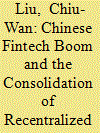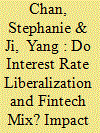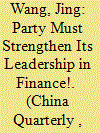| Srl | Item |
| 1 |
ID:
181882


|
|
|
|
|
| Summary/Abstract |
This study analyzes the rise of DC/EP (digital currency electronic payment) in China by proposing the concept of “recentralized authoritarian capitalism.” It first examines how recentralized authoritarian capitalism started in 2010 in the form of a recentralizing of regulations. After considering how the fintech firms have restructured their shareholding in response to the recentralizing regulations, I delineate how these firms further strengthen recentralized authoritarian capitalism, as exemplified by how Alipay has helped realize the Party’s plan to launch DC/EP.
|
|
|
|
|
|
|
|
|
|
|
|
|
|
|
|
| 2 |
ID:
171878


|
|
|
|
|
| Summary/Abstract |
In this paper we attempt to characterize the stability of shadow deposits in China with interest rate liberalization and fintech developments. We emphasize that shadow banks provide higher but riskier returns and such characteristics affect the stability of shadow deposits. In our setting, the stability of shadow deposits is influenced by two offsetting effects, namely: the patience effect, which makes investors more willing to wait because of the potentially higher returns; and the uncertainty effect, which makes investors more likely to withdraw as a result of higher risk. Under liberalized interest rates, the patience effect will erode and the uncertainty effect will be heightened because the post‐liberalization higher return of traditional banks undermines the importance of the extra return of shadow deposits to depositors, while preserving the importance of the risk aspect. Fintech development is modeled as a reduction in the withdrawal cost that facilitates runs. This affects the stability of shadow deposits because of their wider fintech reliance. Regulators should be cautious in pushing interest rate liberalization and fintech application alongside building a safety net for shadow banking.
|
|
|
|
|
|
|
|
|
|
|
|
|
|
|
|
| 3 |
ID:
181140


|
|
|
|
|
| Summary/Abstract |
This article examines the roles digital technologies have played in propelling the shifts in modes of financial governance which have been led by the Chinese Communist Party and enacted by a wide spectrum of regulative actors. Based on analyses of the laws, policies and regulations surrounding digital financial technologies, or so-called fintechs, as well as in-depth interviews with government officials and fintech business executives, I argue that the proliferation of fintechs challenged the existing regulatory schemes defined by the Central Bank and the State Council. This forced a reconsideration of the Chinese government's hegemonic strategies in governing the rapidly changing financial industries. While digital technologies have been promoted to accomplish the goals set by the Party for financial marketization and modernization, a set of institutions including regulatory, organizational and normative rules have been developed to strengthen the Party's control over the digitization of finance. This contradiction is pivotal to understanding the Party's financial policymaking in the digital age.
|
|
|
|
|
|
|
|
|
|
|
|
|
|
|
|